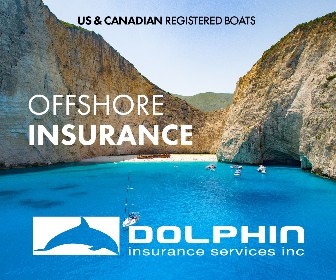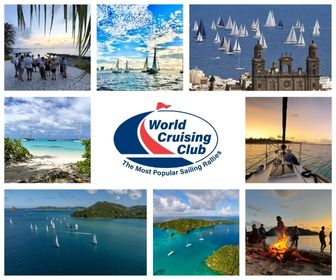Bab El Mandeb Straits To Eritrea: Cruising Report 2005
Published 21 years ago, updated 7 years ago
Bab el Mandeb to Eritrea
The following is an antidote to Bab el Mandeb horror stories.
The winds do not arrive suddenly but build up, and the separate experience of two boats is that they peak near the Djibouti/Eritrea border at Dumera I. We transited at dawn, which is probably the best time for least wind. Both we and our friends went west of the traffic separation zone, and there was no problem keeping >3m clear of the zone. The Djibouti port authority had confirmed that it was ok to go northbound west of the zone.
Before the Strait, we had about 7 kts. That increased to 15kts 2M before the dogleg in the zone and peaked at 18kts average just before Dumera Island. North of the island, the wind was mostly around 15kts. Gusts were not frequent, and they were generally little more than 5kts above the ambient wind.
There was no swell, and no waves other than modest wind chop.
The favourable current was 1.8kts at the SE end of the zone, peaked at 3kts about 2M before the dogleg, and 1.6 km passing Dumera I. By 10M N of the island, it had largely vanished.
Despite the theoretical prevailing SElies, we had either NWlies of 8-10kts or, mostly, no wind apart from land and sea breezes, of about 4 and 8 km, respectively, between Assab and Massawa, and in Massawa, for the last 12 days, we had basically only land and sea breezes.
On average, we had a favourable current of just under 1kt between Assab and Massawa.
We advise getting some Eritrean currency in Djibouti/Aden if you can get at least 20nakfa/US$1.
Assab, Eritrea
No great attractions, but a pleasant place. We anchored behind the breakwater, having failed to raise port control by radio, and were politely asked at 0700 on the following morning to the re-anchor south of the south pier. The port is little used, and we were told that it is closed, but we are not sure about that. The port has little protection from the prevailing SElies. We had almost no wind.
Visas here are US$40, which is $10 cheaper than Massawa, but getting them takes 2 hours and 5 km walking. Customs does not want to see you. Report to the port Immigration office, if you can find it open, and Abraham will tell you what to do.
The official rate of exchange is 15 Nakfa: US$1, but the real rate is >20. You can easily get the real rate on the black market in Massawa, but we suspect that you can probably also get a good rate outside Eritrea. A coffee in Assab costs 2 Nakfa, cf 3 Nakfa in Massawa.
We were impressed by the fact that despite the obvious poverty, and the friendliness of the people, we were not approached by a single person to buy anything or give them anything. A huge contrast with Djibouti. It is not much different in Massawa.
There is a filling station up the main street, but we are not sure whether cruisers can use it without coupons (which cruisers cannot obtain). So not sure about fuel availability here.
Water is in a container near the port entrance. We did not ask, but we suspect that it would be impolitic to take more than a few litres; we do not know whether water in greater quantities is available. Water is available in Massawa.
Plenty of small food shops in the town.
Massawa, Eritrea
Massawa is interesting, not least for the shell and bullet holes in prominent buildings. The people are great, and there is no hassling and little begging.
Anchorage very protected.
Currency readily available at 20Nakfa: US$1.
Contact Mike, who will organise what you want. Availability of fuel is uncertain. The theoretical position seems to be that you need to have coupons, which cruisers cannot get. Petrol is almost unobtainable; Mike got 5 litres for us. Diesel is only slightly easier. Petrol US$1 per litre and diesel about $60 per litre. In summary, you can probably get fuel here, but cannot rely on it, and it may take a few days. Desalinated water is readily obtainable at 4 Nakfa per 10 litres, by the jug.
The coffee here is 3Nfa, tea 1Nfa, and the main course at a local restaurant (we used Eritrea restaurant and liked it) is 45 Nfa. Beer awful but only 7Nfa for the local stuff.
Even if you have obtained visas at Assab, you have to report to port authority and immigration here: painless. Visas cost US$50 here cf $40 in Assab.
One cruiser has just arrived, having been chased and shot at by pirates 75m off Yemeni coast: he escaped, just.
Egyptian visas cost US$13 in Asmara cf $33 in Djibouti, plus the high cost of taxi fares from central Djibouti to the embassy. If coming to Asmara (highly recommended), get Egyptian visas here.
Anne & Ian Gatenby
yacht Fidelio of London





